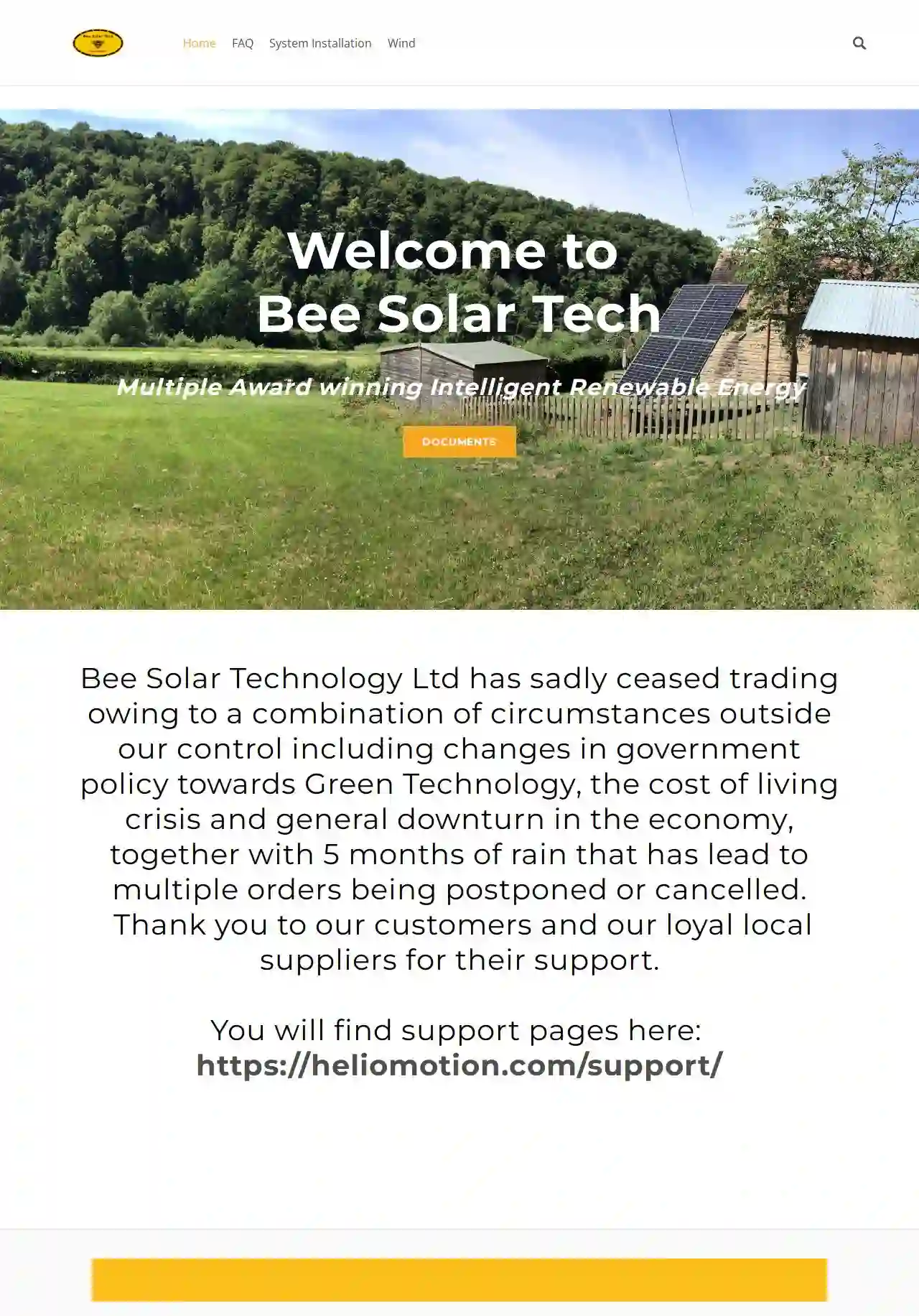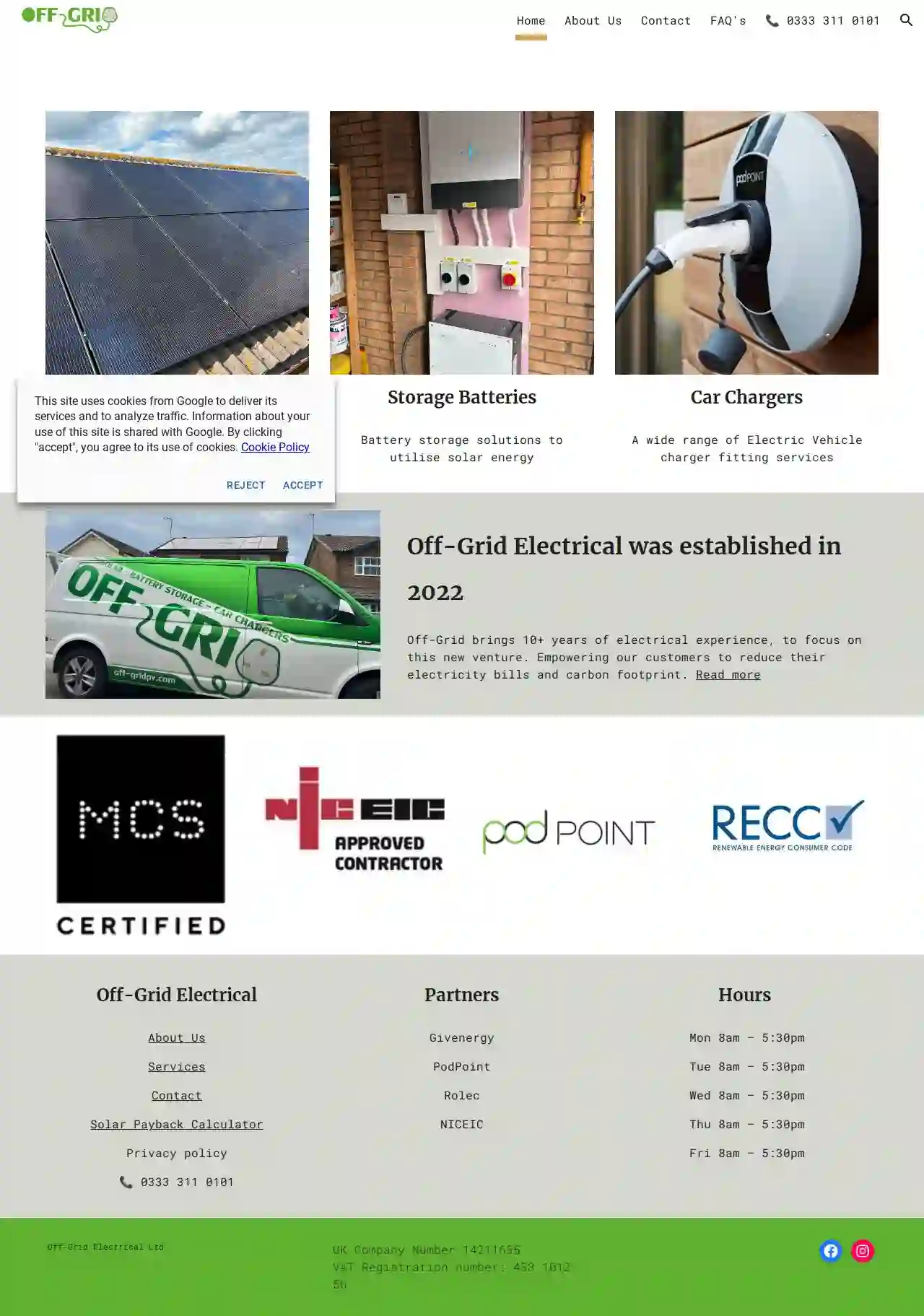Solar Installers Shaftesbury
Top 10 Solar Installers in Shaftesbury
Receive up to 3 Local Solar Installers quotes for your project today! Compare profiles, reviews, accreditations, portfolio, etc... and choose the best service.

Green Nation
51 reviewsThe Long Barn, Manor Courtyard, Stratton-on-the-Fosse, BA3 4QF, GBWelcome to Green Nation, a renewable energy company. We believe solar is becoming the most important source of electricity worldwide, and we are one of the companies making that happen. We are developing and managing solar power generation, and energy storage where needed, across the world. We create and manage renewable energy assets. Our job is to maximise solar energy opportunities for landowners, electricity users, investors and the world at large. We have been in business for almost a decade, developing several solar farms and working with hundreds of owners to put solar on houses, schools and commercial buildings. We now manage solar farms and rooftop systems developed by us and by others generating millions of kilowatt hours of electricity annually.
- Services
- Why Us?
- Our Team
- Gallery
Get Quote
Solgen LTD
26 Lydney Road, Locks Heath, Southampton, SO31 6PY, GBSolgen LTD is an award-winning Community Interest Company dedicated to reducing CO2 and alleviating fuel poverty. We're a Community Interest Company committed to helping people and organisations save energy and money. With no shareholders to satisfy, we invest our profits into the communities we support – be it to establish sustainable energy projects, boost local employment in the energy saving sector, or offer sustainable solutions to the most vulnerable in society. Our business model is based on a holistic reflection combining interdisciplinary and intercultural expertise to provide the highest standards of engineering and consulting services. In the very core of its activities, there is a great experience in the field of cooling, exploitation of geothermal energy by heat pump technology, knowledge of solar and hydraulic systems, connections of economic, market, technical and energy factors at micro and macro level for successful implementation of projects. In the end, we always have a satisfied client, an efficient and sustainable system with minimal environmental impact. Our vision: In times when technology is rapidly developing and the needs for high quality energy are growing, an efficient model needs to be found to match these requirements with environmental protection, which will help solve the burning problems of mankind and fully fulfill the expectation of clients. Our mission is: Satisfied customer! Sustainable development, energy efficiency and independence!
- Services
- Why Us?
- Accreditations
- Gallery
Get Quote
Bee Solar Tech
Gloucester, GBWelcome to Bee Solar Tech, a multiple award-winning intelligent renewable energy company. Unfortunately, the company has ceased trading due to circumstances outside their control, including changes in government policy, the cost of living crisis, and a general downturn in the economy. The company appreciates the support of their customers and local suppliers. For support, please visit https://heliomotion.com/support/.
- Services
- Why Us?
- Gallery
Get Quote
Off-Grid Electrical
Street, GBOff-Grid Electrical, founded in 2022, is a leading company specialising in solar panel fitting, battery storage, and electric vehicle charging. With a strong focus on renewable energy solutions, Off Grid Electrical has established itself a trusted company in the industry. The company's core services include the installation of solar panels, allowing customers to harness the power of the sun and reduce their reliance on traditional energy sources. Their expertise in solar panel fitting ensures that clients receive reliable and efficient systems that meet the highest industry standards. Recognizing the importance of energy storage, Off Grid Electrical offers battery storage solutions. By integrating batteries into solar power setups, customers can store excess energy generated during the day and utilize it during times of high demand or when sunlight is limited. This maximizes the efficiency and reliability of their solar installations. Another key area of specialization for Off Grid Electrical is electric vehicle (EV) charging. As EVs become increasingly popular, the company provides expert installation and maintenance services for EV charging stations. Their association with the MCS, NIC, and Pod Point Charging ensures that customers receive top-notch installations and support, enabling convenient and reliable charging for their electric vehicles. Off Grid Electrical has gained a reputation for its exceptional workmanship, attention to detail, and commitment to customer satisfaction. By offering comprehensive solutions for solar panel fitting, battery storage, and electric vehicle charging, the company actively contributes to the transition towards a more sustainable and eco-friendly future.
- Services
- Why Us?
- Our Team
- Gallery
Get Quote
Energy Monkey Ltd
581 reviewsGloucester, GBUK'S LEADING Renewable energy specialists At Energy Monkey we love all things Victron! And we cater for all your energy requirements whether you have a camper van, marine vessel, off-grid home, grid connected energy storage systems (ESS) or commercial power system. Energy Monkey has a long-standing relationship with Victron Energy and is a specialist in building Energy Storage Systems. Using the wide range of Victron Energy products, we can give you the very best energy solution, to match your needs. Looking for Victron Energy products? Unsure what role each Victron product plays? Why do you need each Victron product? And how each product benefits your energy system? Energy Monkey prides itself on our expertise and technical support team are Victron specialists ready to help. Whether you need a single product or a complete system. We can help with the designing and understanding of what you need, and are here to help you make the correct purchase. Why shop with Energy Monkey? We offer customers a bespoke level of support with system design, advice, technical support, diagrams, remote configuration and after sales support from Victron product specialists all for free when you make a purchase. We have lots of positive reviews, please feel free to read them. Additionally, we have invested in technology. Our website has a livestock feature to reduce “being out of stock” when you have made your purchase. Ensuring your items are delivered in a speedy time. We are constantly working to improve our customer experiences with Energy Monkey. What makes Victron products best in class? Victron Energy has been established for around 50 years and has been designing and manufacturing inverters, inverter/chargers, chargers, batteries and many hundreds of products that can all be used to build almost any power system. Examples being Camper Vans, Marine Vessels, Off grid power solutions for homes, Grid Connected Energy Storage Systems (ESS) and any Commercial Power System you would wish to build. The products are industry leading, high quality and come with great warranties. Energy Monkey, Technical Sales Manager, Paul Collins said “Victron, in a lot of cases, has been doing this longer than anyone else and this is largely why they are always introducing the latest innovations.”
- Services
- Why Us?
- Accreditations
- Our Team
- Gallery
Get Quote
Pegasus total home care ltd
4.56 reviews1 Roewood Road, Fawley, SO45 2Jn, GBPegasus Total Homecare LTD is a family-run business that specializes in renewable energy solutions, including solar PV, battery storage, and air source heat pumps. With a dedicated solar team, they design and install bespoke PV and battery storage solutions for homes, providing a maximized return on investment. They are MCS Accredited Total Renewables Specialists and offer nationwide installation services. Their team is committed to helping homeowners reduce their carbon footprint and transition to a greener future.
- Services
- Why Us?
- Accreditations
- Gallery
Get Quote
Smart Energy
2.65 reviewsPortsmouth, GBCardinal Electrical is a team of highly qualified electricians with over 20 years of experience, working across the UK. Our experienced team of professional electricians can undertake all types of industrial electrical installations. We pride ourselves on being friendly and professional, delivering a high-quality service with minimal disruption to your routine. Our team will ensure that at the end of any project, your space is left clean and tidy.
- Services
- Why Us?
- Accreditations
- Testimonials
- Gallery
Get Quote
Solar Fast - Southampton
Unit 17, Allerton Bywater Network Centre, Letchmire Rd, Castleford, WF10 2DB, GBSolar Fast is a trading style of Gas Fast Ltd. Reg No. 05784955. Unit 17, Allerton Bywater Network Centre, Letchmire Rd, Allerton Bywater, Castleford WF10 2DB. We are authorised and regulated by the Financial Conduct Authority FRN 799102. We are a credit broker, not a lender and have facilities with a panel of lenders. Credit is subject to status and affordability.
- Services
- Why Us?
- Gallery
Get Quote
LA Electrical Services | Solar & EV Charging
519 reviewsOffice 2, Main Road, Easter Compton, Bristol, GBSince 1997 we’ve been installing Sockets & Lights, Solar Power and EV Charge Points in Bristol & the surrounding areas. Skilled, Friendly Electricians, Quick Response, NICEIC & MCS Approved Contractor, 5 Star Service. Request a free quote or get in touch. We pride ourself on our workmanship and quality. We’ve built a reputation of work being completed to an exceptional standard and have hundreds of happy customers. See pictures and more reviews here. We're rated Excellent on Trust Pilot and 5 Stars by our customers on Google and Facebook.
- Services
- Why Us?
- Accreditations
- Our Team
- Gallery
Get Quote
Infinigreen
Southampton, GBWe specialise in helping customers to generate high returns on green energy whilst saving the planet. Book A Free Consultation Sustainable solutions with YOUR priorities in mind Not everyone has the same goals in mind when switching to green energy. So whether you’re looking to reduce your carbon footprint, maximise long term ROI, minimise pay-back time, become energy-independent, or some combination of the above – It’s important that you find a green energy installer who understands your priorities and how to tailor your solution to suit your needs. At InfiniGreen, we take the time to understand your needs and how to deliver the optimal solution for your green energy project. It all starts with our free consultation where we’ll discuss what you’re trying to achieve, and help you to find the best solutions for your situation. Book A Free Consultation View Services
- Services
- Why Us?
- Testimonials
- Gallery
Get Quote
Over 3,485+ Solar Installers on our platform
Our solar pros operate in Shaftesbury & surrounding areas!
SolarCompaniesHub has curated and vetted Top Solar Contractors near Shaftesbury. Find the most trustworthy contractor today.
Frequently Asked Questions About Solar Installers
- Use a Directory Like SolarCompaniesHub: We connect you with pre-screened, qualified solar installers in your area.
- Check Online Reviews: Look for positive reviews on Google, Yelp, and other reputable sources.
- Ask for Referrals: Get recommendations from friends, family, or neighbors who have gone solar.
- Verify Credentials: Ensure the installer is licensed, insured, and certified by reputable organizations (e.g., NABCEP in the US).
- Get Multiple Quotes: Compare quotes from at least 3-4 installers to find the best value for your project.
- Ask Questions: Don't hesitate to ask installers about their experience, warranties, and the process they follow.
What happens to my solar panels during a power outage?
What happens if my roof needs to be replaced after I install solar panels?
How do I find a good solar installer near me?
Can I go completely off-grid with solar panels?
What happens to my solar panels during a power outage?
What happens if my roof needs to be replaced after I install solar panels?
How do I find a good solar installer near me?
- Use a Directory Like SolarCompaniesHub: We connect you with pre-screened, qualified solar installers in your area.
- Check Online Reviews: Look for positive reviews on Google, Yelp, and other reputable sources.
- Ask for Referrals: Get recommendations from friends, family, or neighbors who have gone solar.
- Verify Credentials: Ensure the installer is licensed, insured, and certified by reputable organizations (e.g., NABCEP in the US).
- Get Multiple Quotes: Compare quotes from at least 3-4 installers to find the best value for your project.
- Ask Questions: Don't hesitate to ask installers about their experience, warranties, and the process they follow.